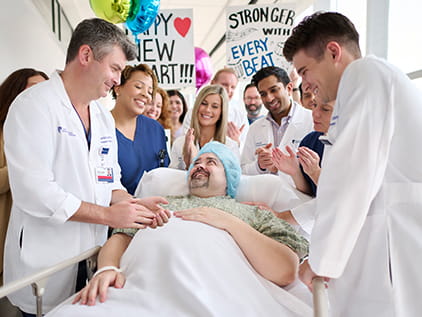November 07, 2019
When Trish Ford received a diagnosis of polycystic kidney disease (PKD) at age 30, she was shocked. She'd been struggling with stomach pain and high blood pressure since she was a teenager, but never imagined the underlying cause was PKD.
"They didn't know enough about PKD back in the '80s," Trish says. "I was never correctly diagnosed. Fortunately, experts know a lot more now."
PKD is a genetic disease, but Trish was unaware of any family history of the illness. Her mother tested negative. Her father had not been tested, but not long after Trish's own diagnosis, found himself undergoing an emergency kidney transplant.
As time went on, Trish's kidneys began to fail. Her kidney function fell below 20%, and she was placed on the transplant list. It can be a long wait. Nephrologist Jeffrey Klein, MD, explains it can take up to 3 years for some patients. One way to shorten the wait, he says, is with a living donor.
"Living donations are always encouraged because there are fewer unknowns about the organ donated," says Dr. Klein. "We know more about the donor's health, and the time the kidney is kept on ice is significantly reduced. Living donor kidneys tend to work longer as well."
Moved to donate
Meanwhile, unbeknownst to Trish, Rita Suppes found herself intrigued by the concept of living kidney donation. A teacher of at-risk students and a foster mom, Rita and her selfless nature had already benefited many. There was something about kidney donation – an opportunity to help another person regain their health – she simply felt called to do.
"I did the research and confirmed donating a kidney was safe," Rita says. "After that, I knew it was the right decision." She also learned there is no cost to the donor; the recipient's insurance covers the whole procedure.
Rita contacted the Midwest Transplant Network and was directed to The University of Kansas Health System, which specializes in living kidney donations.
"The University of Kansas Health System provided excellent testing to make sure I was in good health and would be OK," Rita says. "They asked throughout the process, even up until I was ready to be wheeled back to surgery, if I had any concerns or second thoughts about donating."
For Trish, finding a living donor match in Rita was nothing short of a miracle.
"I was at work when I got the call," Trish remembers. "I was jumping up and down, overjoyed. Being on the list, you go through a lot of emotions – fear, anger, excitement. You are waiting for a donation that is going to save your life."
If I can help someone else not have to suffer through PKD and kidney failure, I want to do that. I'm here for a reason, and I think it's to get this message out there and help people have less fear about living donation. – Trish Ford
Living kidney donor transplant recipient
Bonded in health
Trish and Rita didn't meet until well after their kidney transplant surgeries. The health system maintains donor and recipient confidentiality, sharing identity and contact information only once both parties have requested it. Trish and Rita exchanged cards and letters prior to meeting in person, but both knew they wanted to know each other.
When they met, they felt like family, like sisters. Rita says they share a special bond and a mission to tell other people about the living donor experience, to dispel fear or confusion about the process and encourage living donors to step up.
As for Trish, she wanted to do her part to further PKD research and treatment for others like herself. She donated her diseased kidneys to the health system along with DNA that will help researchers learn more about how to combat the disease.
"We're looking at what happens to the cysts over time and what changes occur in the actual architecture of the kidney," says Dr. Klein. He adds that it is rare for PKD patients to donate their kidneys to researchers, so Trish's decision is highly valuable.
"If I can help someone else not have to suffer through PKD and kidney failure, I want to do that," says Trish. "I'm here for a reason, and I think it's to get this message out there and help people have less fear about living donation."
"The team at the transplant center did an amazing job making sure I understood the process and was healthy myself, and offered support after the donation," Rita adds. "I really want to help people learn about the joys of being a living donor and to know that donating is 'doable' and safe."

Exploring the gift of life
Could organ transplant be right for you? Request an evaluation today. Our team will be happy to talk with you and support you through your health journey.
Patient testimonial: As with all treatments, individual patient results vary. It is important to discuss your treatment options with your healthcare provider.





